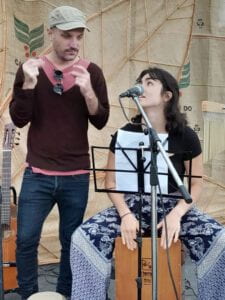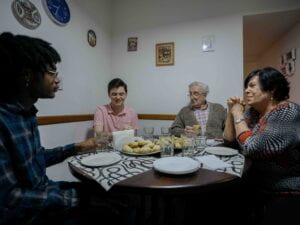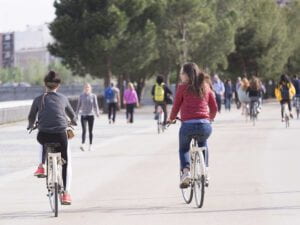One of the many benefits students gain from homestays is the opportunity to fully immerse themselves in the local language. Here, a few students share their experiences learning, growing, and perfecting their language skills with their host families.
Fiona Cantorna, an Environmental Studies and Spanish dual major at the College of Arts and Science (CAS), chose to live in a homestay because she “wanted to connect more to the Porteño (Buenos Aires, Argentina) community.” That’s exactly what she did: her host family was a part of a weekly music ensemble, and Fiona had the chance to join them in making music. “My homestay was instrumental in improving my Spanish,” she says. “It provided a casual environment to practice my listening and speaking skills, in which I learned lunfardo (Argentine vocabulary) and even picked up the local Rioplatense accent!”
Chloe Bouquet Brown, an NYU Gallatin School of Individualized Study student, lived with host Mina and her son, Xach, in Paris’ 10th Arrondissement during her time studying away. “My French transformed enormously throughout my year with Mina and Xach,” Chloe recalls. “They pushed me to practice French around the house. It was difficult at times, being tired from classes and yearning for home, but in the end, my confidence grew with their positive encouragement in the sanctity of the homestay. I interned at a local art gallery and could ask them about professional terminology and French work customs.”
Justin Strong, a Business major at NYU Stern concentrating in marketing and management, chose to live in a homestay at NYU Florence because he knew the impact it would have on his Italian. “The homestay experience was phenomenal for my Italian,” Justin shares. “I told my host mother that I didn’t know any Italian, but I wanted to speak and learn as much as possible. Throughout the semester, we persisted in Italian, and it really paid off. Soon enough, we were having full conversations. I was really grateful for the homestay experience. By the end of the term, I was chatting with numerous locals without needing to switch to English.”
Sam Husemann-Erickson, a CAS Politics major, says he decided to live in a homestay “not only because of the lower cost, but also because it was an excellent way to improve my Spanish and get to know Argentine cuisine and culture in depth.” His hosts were a retired couple who helped him navigate Buenos Aires and loved to cook.“My host parents were more than happy to teach me Argentine expressions and more natural ways to express myself, and our discussions over dinner and breakfast were a great way to practice my Spanish throughout my stay.” His host mother even kept track of the recipes he liked and, at the end of the semester, wrote them down so he could take them home.
Devyn Costello-Henderson, a Vocal Performance major concentrating in classical voice at NYU Steinhardt, had studied French for years before deciding to study away at NYU Paris. She couldn’t pass up the chance a homestay gave her to improve her language skills. “Staying in a homestay forced me to become comfortable speaking the language,” Devyn continues. “I didn’t feel the need to speak perfectly, but I could communicate well with the family. My host family loved to chat with me, and it was very helpful to listen to their everyday conversations in French. I found I could quickly understand almost everything they said, even if my own vocabulary was not as complete. I had fluid conversations in French without needing to pause often to search for words. I still made mistakes, but I had a higher comfort and confidence level speaking the language.”




